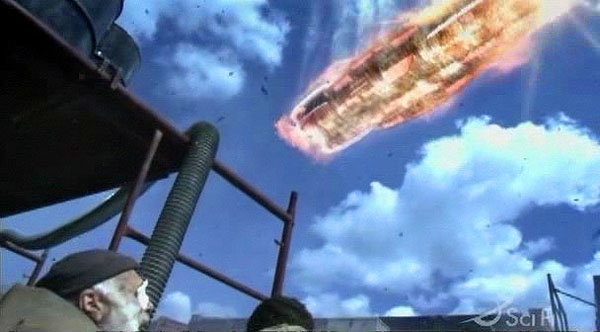SOUND
IN
SPACE:
CAN YOU HEAR ME NOW?
HOME -
SOUND IN SPACE - LASERS - GRAVITY - BIBLIOGRAPHYMany
movies
such as Star Wars or Star Trek have amazing space battles,
creating fantastic action scenes and showing great special effects.
Spaceships zip after each other, missiles are traded, lasers and fired,
and the sound of subspace engines shakes the screen. However, there's a
problem with this picture; physics gets tossed out the window to give
the viewer some nice scenery. In truth, I'm not really complaining, but
the facts still need to be upheld.
The scene described above has a few flaws, but one of the most common among science fiction is sound in space. Sound itself is a fairly easy concept to understand. Sounds are waves of pressure at specific frequencies that our ears, or anything else that can pick up the vibrations, detect and translate into information we care about. The problem, however, is that sound requires matter to work. Without something to vibrate along the way, like a solid, liquid, or gas, sound waves can't travel.
So take, for example, a space ship. As it rockets along the edge of the universe, the vibrations of the engines can create sound. That sound can be heard by the pilot, since the space ship is solid, and the ship is filled with air. Since there is matter for the sound waves to interact with, the sound can be heard. However, if you are outside the space ship, you wouldn't hear anything. Space is a vacuum, and does not have anything for the sound waves to interact with to allow them to travel to our ears.
The scene described above has a few flaws, but one of the most common among science fiction is sound in space. Sound itself is a fairly easy concept to understand. Sounds are waves of pressure at specific frequencies that our ears, or anything else that can pick up the vibrations, detect and translate into information we care about. The problem, however, is that sound requires matter to work. Without something to vibrate along the way, like a solid, liquid, or gas, sound waves can't travel.
So take, for example, a space ship. As it rockets along the edge of the universe, the vibrations of the engines can create sound. That sound can be heard by the pilot, since the space ship is solid, and the ship is filled with air. Since there is matter for the sound waves to interact with, the sound can be heard. However, if you are outside the space ship, you wouldn't hear anything. Space is a vacuum, and does not have anything for the sound waves to interact with to allow them to travel to our ears.

Example of how this all works.
When we look at say, Star Trek, and see The Enterprise flying around in space fighting in giant battles, every explosion, ever “PEW PEW” of the lasers, and every rumble of the engines we hear is breaking the laws of physics. Assuming that we take the place of the camera in open space, there is no matter for the sound waves of that giant exploding spacecraft to interact with, so we don't hear it.
With all of that said, is there a possibility that it could work? Yes, but not in open space. If a ship were to enter the atmosphere, even at high altitude, the matter from all the atmospheric gasses might be able to transfer the pressure oscillations from the source of the sound to, say, someone flying through the atmosphere. A fighter jet at extremely high altitude breaking the sound barrier can still be heard on the ground.

Yeah, I would want to hear that too.
Thomas Edwards - Physics 211x - FH1 - 2010